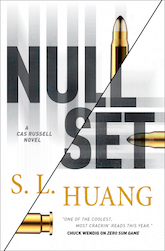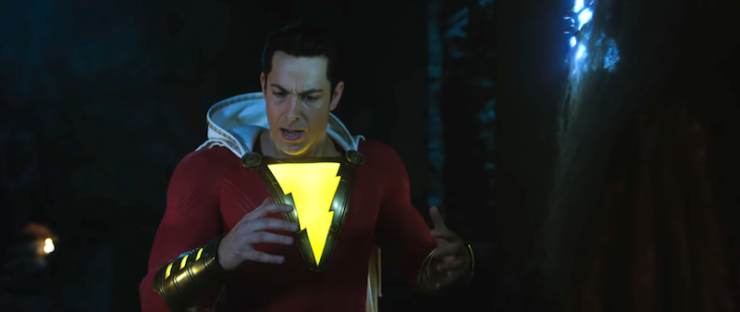In an effort to continue diversifying the DC film universe brand, Shazam! seems like a no-brainer. The story of a superhero who is secretly a teenage boy is great fodder for humor and a sharp veer away from the Snyder-esque grit-n-grimace that audiences have become intimately acquainted with for the past several years. But was DC ready to embrace it’s kid-friendlier goofy side?
[Spoilers for Shazam!]
Shazam! is the story of Billy Batson (Asher Angel), a foster kid who keeps running away from homes to find his real mother, who he lost sight of in an amusement park as a small boy. After moving in with a new foster family, headed by Rosa and Victor Vasquez (played by the utterly endearing duo of Marta Milans and Cooper Andrews, who are not used nearly enough in the film), Billy finds himself inheriting the powers from an ancient wizard (Djimon Hounsou) named Shazam. He becomes the Champion of Eternity, morphing into the adult form of Zachary Levi whenever he shouts the wizard’s name—unaware that Dr. Thaddeus Sivana approached the wizard first on a quest for revenge, and unleashed the Seven Deadly Sins as his own personal army.
Shazam’s biggest problem is that it’s trying very hard to be funny, but it doesn’t quite succeed. Most of the gags boil down to laughing over a grown man who is actually a fourteen-year-old boy, but Levi’s performance as Billy never truly aligns with the actual teenager he’s emulating. As a result, most of his schtick registers like the improv exercises plenty of theater kids can remember doing in high school—now pretend you’re a sloth! There are too many one-liners and not enough comedy that simply stems from Billy’s personality inhabiting an adult body. As a result, teenage Billy and superhero’d Billy often barely register as the same character, a flaw in the central conceit needed to make Shazam! really work as a coherent narrative. Where Angel plays things closer to the vest, Levi is outgoing and goofy. If the idea was that being superpowered gives Billy the confidence he needs to be more gregarious, the movie never bothers to communicate that.
In addition, while Angel portrays Billy as a nuanced and emotional kid, most of the humor in Levi’s Billy revolves around low-hanging stereotypes on teenage boys and small children—like the moment where he calls a 30-year-old an “old woman” (only to flirt with another woman much older than his teenage self one scene later), or the time where he goes into a strip club for free hot wings and is only bothered by the fact that he ran out of money so quickly. (Sure, teenagers are interested in sex and sexuality, but the idea that Billy launching himself into an adult situation wouldn’t prompt even a minor level of discomfort doesn’t ring true, making the gag hollow.) The best humor stems from all of Billy’s foster siblings at the Vasquez house, who elevate the film every moment they’re on screen. Unfortunately, it takes well over an hour of movie before we see the group with any regularity.
One thing the movie has going for it is the acknowledgment that Billy and his family exist in a universe where Batman, Superman, and Wonder Woman are already known, and the ways that this shapes society’s feelings on superheroism. Billy’s foster brother Freddy (Jack Dylan Grazer) is a superhero fanatic, and not just for the fact that he has a collectors mentality or memorizes facts about caped crusaders—Freddy cares about the research being done on superpowered beings, the academic side of super studies, making him the most realistic “fan” we’ve seen on film to date. And there are other little touches as well—a fight in a toy store where copious amounts of Supes and Bats gear are available to chuck at the nearest threat, or the bumper sticker on Rosa Vasquez’s car, which can’t help but make you a little teary when you see that it reads “I’m a foster mom—what’s your superpower?”
Buy the Book


Null Set
Most of the film’s story framework is lifted from the New 52 reboot of Shazam—this is where Billy’s background as a foster kid comes from—and while the newer version of the character in the comics brought some welcome changes, there are still some unfortunate missteps. Freddy is disabled, as he in the comics, but still falls victim to ablest rhetoric—he is physically bullied, and his disability puts him in the position to require “saving” by Billy (for some reason, his older sister Mary who is perfectly capable of coming to his aid chooses not to in that moment).
The New 52 reboot gave Billy a new Shazam Family (formerly the Marvel family, before a DC/Marvel lawsuit settled that particular battle) in the form of his siblings, Freddy, Mary (Grace Fulton), Eugene (Ian Chen), Pedro (Jovan Armand), and Darla (Faithe Herman), who gain the ability to fight alongside him using the Shazam power. But it’s off-putting when that power—which puts the user in “peak physical condition”—makes Pedro thin and erases Freddy’s disability… as though it’s impossible to conceive of a “peak” condition that would allow for a diversity of bodies. On the plus side, DC has officially beaten Marvel movies on the queer representation front by letting the audience know that Pedro is not really into girls. (You’ve had twenty-one films, MCU.)
There are several painful social issues tackled in Shazam!, but the movie shies away from most of them when it needs to either embrace and address them, or leave them off entirely. Billy’s separation from his mother is not given the attention it requires, and neither is Dr. Shivana’s abuse at the hands of his own father and brother. There is also a moment in the film where we learn that Billy’s mother is a victim of domestic abuse, but nothing comes of it. Overall, the film is startlingly callous toward people who have suffered violence—seemingly because their trauma can’t be fixed with superhuman know-how. Addressing serious, real-world issues in a comical superhero romp can obviously work, but there is a need to handle them with care, especially when your audience skews younger. This responsibility goes ignored for the duration of Shazam!, and it makes the film far darker than it seems to think it is.
That said, the final half hour of Shazam! is fantastic, full of moving themes on power and sharing and family. It’s easy to see what the film might have been had it carried these ideas all the way through the narrative with an equally strong voice. During the final showdown the movie introduces powerful themes—that you don’t have to be a perfect person to do good in the world; that it’s good to rely on the people who love you; that family is something that you make, not something that you’re given—but these should have been brought to the forefront earlier. We get a great dose of mini-movie that shows the character’s real potential, and then we’ve arrived at the end.
Children are still likely to enjoy the film, as it hits the necessary beats for your average kids movie. But Shazam! would have done better to simply remember its own central cause—dedication to family, and the pursuit of doing the best you possibly can.
Emmet Asher-Perrin is still really annoyed that they felt the need to put a strip club in this movie. You can bug him on Twitter, and read more of her work here and elsewhere.










